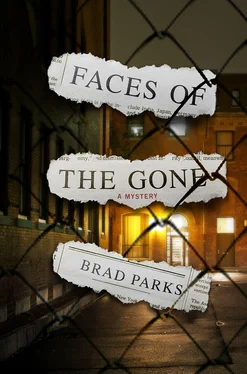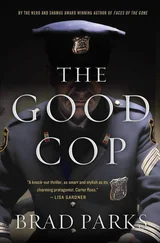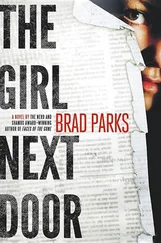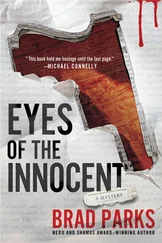Brad Parks - Faces of the Gone
Здесь есть возможность читать онлайн «Brad Parks - Faces of the Gone» весь текст электронной книги совершенно бесплатно (целиком полную версию без сокращений). В некоторых случаях можно слушать аудио, скачать через торрент в формате fb2 и присутствует краткое содержание. Год выпуска: 2010, ISBN: 2010, Издательство: Minotaur Books, Жанр: Триллер, на английском языке. Описание произведения, (предисловие) а так же отзывы посетителей доступны на портале библиотеки ЛибКат.
- Название:Faces of the Gone
- Автор:
- Издательство:Minotaur Books
- Жанр:
- Год:2010
- ISBN:9780312574772
- Рейтинг книги:3 / 5. Голосов: 1
-
Избранное:Добавить в избранное
- Отзывы:
-
Ваша оценка:
- 60
- 1
- 2
- 3
- 4
- 5
Faces of the Gone: краткое содержание, описание и аннотация
Предлагаем к чтению аннотацию, описание, краткое содержание или предисловие (зависит от того, что написал сам автор книги «Faces of the Gone»). Если вы не нашли необходимую информацию о книге — напишите в комментариях, мы постараемся отыскать её.
Faces of the Gone — читать онлайн бесплатно полную книгу (весь текст) целиком
Ниже представлен текст книги, разбитый по страницам. Система сохранения места последней прочитанной страницы, позволяет с удобством читать онлайн бесплатно книгу «Faces of the Gone», без необходимости каждый раз заново искать на чём Вы остановились. Поставьте закладку, и сможете в любой момент перейти на страницу, на которой закончили чтение.
Интервал:
Закладка:
“Oh, nothing,” I said instead. “I was just realizing that I’ve spent my entire career interviewing cops and never once had the tables turned on me. Funny, isn’t it?”
“You’re lying,” she said. “That wasn’t what you were thinking about at all.”
“I wasn’t?”
“I know when you’re lying. I hope you don’t play poker. Your tells are as obvious as turnpike billboards.”
The implication-that I couldn’t tell a lie to a woman I might end up sleeping with-was too immense for my head to process at a time like this. So we walked in silence the rest of the way to police headquarters. I went up to the desk sergeant on duty, announced myself, then was asked to take a seat in a lounge area that reminded me of a hospital waiting room except that it had Wanted posters for wall hangings.
A battered television was bolted into the ceiling in the corner, and we arrived just in time for the News at Noon update. The TV was muted-as all TV news should be-and I was going to keep it that way until I saw they were leading their broadcast with the Stop-In Go-Go fire. I walked over and pumped up the volume in time to catch the words “Let’s go live to Irvington.”
The scene cut directly to the Channel 7 Smurf, who no longer looked so small now that he was appearing alone on camera with nothing to set his diminutiveness in perspective. The word “LIVE” appeared in the upper left-hand corner of the screen, and the blackened remains of the Stop-In Go-Go were framed perfectly in the background.
“Thanks, Tom,” the Smurf said. “A bizarre story here, where police say an unknown arsonist has torched this and several other buildings, apparently in revenge for something written in a newspaper article.”
The next scene was a quick scan of the top of that day’s Eagle-Examiner, then footage of Miss B’s place, then of the heap of rubble that remained of Booker T. The Smurf was talking over it the entire time and I was mostly ignoring him until he said, “. . and we have this footage of a dramatic confrontation between one of the dancers and the man who wrote the article, Eagle-Examiner reporter Carter Ross.”
I cringed. Other than Van Man, this was the last thing in the world I wanted to see: Tynesha raving at me, and me pleading in return.
Even having participated in the original event, it was hard to follow the clip they had chosen. They used a special effect to strategically blur her wardrobe malfunctions. They used a bleeping sound every time she swore. The net effect was that most of the clip was either blurred or bleeped.
“That was entertaining,” Tina said when it was over. “Did you really just try to engender sympathy with a source by telling her about your dead cat?”
“Yes, I’m afraid I played the cat card.”
“Interesting,” she said. “At least we don’t have to worry about losing you to network news.”
“Be honest,” I said. “How bad was it?”
“Remember that movie with Winona Ryder and Richard Gere?”
“Ouch.”
Just then, Hakeem Rogers, the Newark Police Department’s spokesman, appeared. Actually, calling Hakeem Rogers a spokesman was a bit of a stretch, since most of the time he was paid to say nothing. We had a relationship based on sarcasm and mutual irritation.
“Hi, Carter,” he said, pretending he was happy to see me.
“Hello, Officer Rogers,” I said.
“Gee, it really breaks my heart you wasted your time coming down here. We don’t need you.”
“What do you mean?”
“It’s not our case anymore.”
“So whose case is it?”
“We turned it over to the feds,” Rogers said, like I should have somehow known this already.
“Which feds?”
“The Newark Field Office of the National Drug Bureau,” he said. “They told us they had reason to believe the crime involved international drug smuggling and they claimed jurisdiction over it.”
“Huh,” was all I could say.
“Yeah, so you can go bother them now,” Rogers said. “I’m glad we’re rid of it. We got enough murders we can’t solve. If you ask me, they’re not going to do any better with it than we did.”
The Director wasted little time pondering his morning’s work. There was another job to do, and he knew it was going to take several hours: he had a lot of pictures to print out, and ink-jet printers were simply not built for speed. The Director didn’t like using his own printer-in addition to the printer being slow, it meant fussing with those annoying ink cartridges-but he had no choice in the matter. These were not the kind of pictures he could take to the local Fotomat.
They were the snapshots the Director had ordered Monty to take of Wanda Bass, Tyrone Scott, Shareef Thomas, and Devin Whitehead in the moments after their deaths. They were postmortem portraits. Faces of the gone.
And now that the news of the four dealers’ deaths was in every newspaper and on every television-and had no doubt captured his employees’ attention-the time was right to deliver the high-impact message the Director wanted to impart.
He made forty-two packets, one for each of his remaining dealers, to be delivered along with their weekly shipment. Each packet included a set of the photos and a memo:
TO: All Employees
FROM: The Director
RE: Reminder about cutting
It has recently come to my attention that four of our employees were cutting The Stuff as a way of stretching out supply. The pictures enclosed can be considered the consequences of that decision. A similar penalty will await any other employees who make a similar mistake. We have put strict quality control measures in place and we will continue to perform spot checks in the field to ensure compliance on the part of all employees. Only with 100 percent purity can we achieve our goals.
It is my hope this is the last such directive I will have to issue on this subject.
The Director read the memo over three times to make sure it struck the right tone. Then, because he liked how it looked, he found “The Stuff” stamp on his desk and imprinted its logo at the top of each memo-one last sign of authenticity.
In a rare display of initiative, Monty tried to convince the Director it was madness to send out the packets. Mathematically, weren’t there good odds one of them could slip into the wrong hands? Couldn’t this be used as evidence against them?
But the Director only laughed at Monty’s anxiousness. Even if one of his dealers took the package directly to the chief of police and spilled everything, it would have no impact on the Director’s operation. The Director had the local police under control. Besides, each level of his organization was essentially blind to the level above it.
The Stuff could never be traced back to him.
CHAPTER 7
Now that Van Man had Uncle Sam on his ass, my chances of celebrating my thirty-second birthday had improved slightly. A smart bad guy could screw around with the Newark cops, who had never been accused of being the world’s sharpest crime-solving unit. The feds were a different matter. The feds had resources, know-how, and a certain no-nonsense attitude about things. And if they decided a case was a priority, they had a much longer attention span, as well.
Hopefully it was enough to convince Van Man to go underground and not risk emerging to, say, grease a local newspaper reporter.
Yet while these were all good developments for my personal life, it was not as promising for me professionally. Prying information out of local law enforcement was like playing with an old fire hydrant: if you kept taking whacks at it, you could eventually get it to leak. Feds were made of different material, stuff that was sealed a lot tighter.
Читать дальшеИнтервал:
Закладка:
Похожие книги на «Faces of the Gone»
Представляем Вашему вниманию похожие книги на «Faces of the Gone» списком для выбора. Мы отобрали схожую по названию и смыслу литературу в надежде предоставить читателям больше вариантов отыскать новые, интересные, ещё непрочитанные произведения.
Обсуждение, отзывы о книге «Faces of the Gone» и просто собственные мнения читателей. Оставьте ваши комментарии, напишите, что Вы думаете о произведении, его смысле или главных героях. Укажите что конкретно понравилось, а что нет, и почему Вы так считаете.












